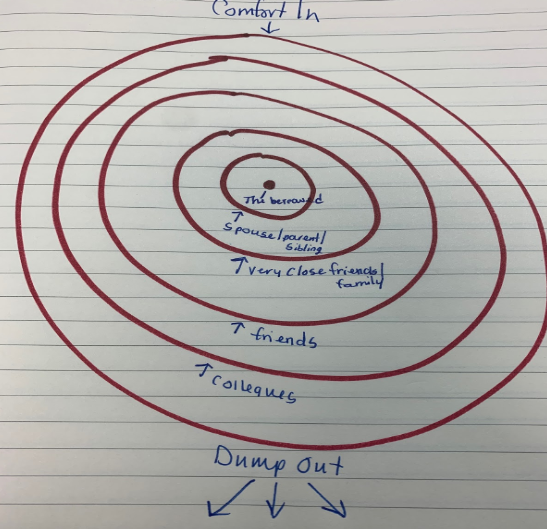There’s no real way to prepare for the loss of a loved one, and it’s especially true when the loss happens in an utterly tragic and unexpected way. Do you know that the death of a loved one ranks in the top ten list of most stressful life events, and that’s for adults? The impact a tragic loss has on children is far more significant. That’s why it’s incredibly important that, during the onset of your grief, you seek grief support in any or all forms available to you and your family.
What is Grief?
Grief is an intense and natural set of emotions following the loss of a loved one, divorce, or even the anticipation of a terminally ill friend or family member. From shock, disbelief, anger, to profound sadness and pain, grief takes on many emotions.
When you add to these emotions societal and cultural pressures like having to hold down a job, continuing education, or caring for your children – the strength and intensity of these emotions can become greater at times, or seemingly unbearable.

The 5 Stages of Grief
Because grief doesn’t necessarily end but change, there are five stages to grief most people go through. These stages are:
- Denial and Isolation
- Anger
- Bargaining
- Depression
- Acceptance
With these five stages, it’s essential to know that not everyone goes through them in that order or even back to back, and the process as a whole can take a short to a long time, all depending on the person. Here are some other important factors about grief:
Grief is Different for Everyone
Grief manifests differently depending on the person and circumstance. Some people become numb and don’t feel anything until months later, while some people feel everything right away. For some, grief comes all at once, and for others, it’s a slow process.
Further, grief shows differently for each person. This means that where one person might show their pain through crying, another might not show any emotion.
Grief is Not Linear
Grief is not a straight line of milestones you meet and move past. There is no clear starting emotion and a definite end. One moment you might be in the acceptance stage and then a week later, move back to the bargaining stage. Be patient with yourself and your loved ones.
Grief Does Not Always End, But Changes
Do not expect yourself or your loved ones to be “done” with grief. Grief doesn’t go away, but in time, it changes, and life begins to find a new normal.
Grief Needs Support
Although grief is a natural and normal reaction to loss, it’s incredibly important to seek support. When grief is suppressed or not processed in a healthy manner, it can lead to lifelong struggles with depression, suicidal thoughts, heart disease, and more.

Where to Find Grief Support
There are many ways to seek support for your grief from leaning on your inner circle to seeking counseling; what matters is that you’re working through it. Essentially, you need to TALK about it. Studies have shown that merely verbalizing our sadness and feelings reduces the actual pain they cause. With that in mind, here are some things you can to help your grief.
Talk to Your Friends
If you have that circle of friends or family that you can lean on, take advantage of it. Talk about how you’re feeling, cry, or be with them in silence. Having a steady sense of someone’s presence during the onset of loss can set you on a healthy course of grief.
Talk to Your Community
Equally as important as leaning on your friends, is leaning on people that are also grieving. Lane County offers many grief support groups that are free to the public and put on by trained professionals.
PeaceHealth Adult Bereavement Support Groups
These support groups, put on by PeaceHealth, are eight-week classes put on during the day and evenings. They are free to the public and open to adults at any stage in the grieving process. Please call to learn about the times, dates, and locations.
Phone: 541-205-7400
Address: 677 E. 12th Ave Eugene, Oregon 97401
The Compassionate Friends
Compassionate Friends is a national non-profit organization that offers friendship and support to those in grief through loss. This ongoing support is free to the public and open to bereaved parents, grandparents, siblings, and friends.
Phone: 541-525-4857
Address: 2411 Martin Luther King Blvd Eugene, Oregon 97401
Meeting time: First Wednesday of each month at 7pm
Courageous Kids Grief Support for Youth
This support group is for youth ages 6-17 and their families. There are weekly support groups and summer camps, and they are free to the public.
Phone: 458-205-7474
Address: 677 E. 12th Ave Eugene, Oregon 97401
There are many grief support groups in Lane County from churches to hospitals. If you can’t quite find what you’re looking for, don’t hesitate to reach out to us, we’re happy to help.
Talk to a Counselor
There’s something to be said about talking to a stranger about your grief, and knowing this stranger is trained and ready to help. Professional counselors are equipped to handle all the intense emotions of grief. Counselors will help you learn to cope and manage that and set you on a course to healing and overcoming.
There are many types of counselors to look for, and it can seem a bit daunting. From religious counselors to a more holistic approach – you have plenty of options. A great way to find the right fit for you is to reach out to your medical provider or ask someone you trust.
Talk to Your Doctor
There are times where grief takes on a mind of its own, and it can seem unending, which makes even the simplest of life tasks difficult. If you’re experiencing grief and having a hard time doing basic things like showering, eating, or caring for your kids, contact your medical provider immediately.

How to Support a Bereaved Friend
Grief doesn’t just affect the person that lost someone. Grief touches on everyone – and that includes friends of the bereaved. It can be hard to know what to say, what not to say, or how in the world you can help. However, being a supportive friend is simpler than you think. Here are five tips on how to love a bereaved friend.
1. Presence
Simply being present and showing up is a great way to support your friend. Here are some ways you can be present, even if your friend doesn’t want to talk:
- Sit there with them not expecting anything
- Bring dinner for the family
- Clean their house
- Send text messages letting them know you’re thinking of them
- Go to support groups with them
- Run errands for them or with them
 2. Remember the Ring Theory
2. Remember the Ring Theory
The ring theory is a practice that helps us know how to respond to tragedy or to a loved one that has experienced tragedy. It goes like this:
If the crisis or tragedy is happening to you, you’re the center circle. If the crisis or tragedy is happening to someone you love, you’re an outside circle.
Step 1. Draw a circle and in the center of it, write the name of the person experiencing the crisis.
Step 2. Now draw a larger circle around that first and write the name of the person closest to the person experiencing the crisis or loss. This is usually a best friend, sibling, spouse, parent, or maybe even you.
Further Steps: In each larger ring/circle, write the next closest person name on it.
Rules of The Ring Theory:
The person in the center of the ring can say anything he/she wants to anyone on the outer rings. Nothing is off limits, and nobody is off limits.
However, no matter what the other rings might be feeling, they need to work outward, not inward. So the outer rings can go to anyone about anything as long as it’s outward – and not going closer to the center of the rings.
The goal is this: comfort in, dump out. When you’re talking to someone close to the center of the ring, your job is to listen and help, and that’s it. It’s not your place or time to bring up your feelings. However, the outer circles are there for you should you need support as well.
3. Don’t Be Afraid to Talk About the Person They Lost
It can be hard to know if it’s OK to bring up the person your loved one lost, and more times than not – they love it. Instead of talking about memories causing pain, the bereaved enjoy learning new things. So please don’t be shy and bring up memories or stories your friend may not have heard before, and help keep their memory alive.
4. Be Gracious
Grief changes people, and sometimes it can feel like they change for the worst. If this happens, be kind and gracious and love them where they are at. Never bring up how they’ve changed and instead, allow room in your relationship for that change. Your friend might cancel plans more often, not laugh as much, or even just check-out for a while. Don’t panic; this is all a normal response to grief.
5. Be Consistent
On the onset of a tragic loss is when your friend will receive the most flowers, cards, hugs, and check-ins. However, all of these things fade over time, and that’s when your friend will need you the most. So don’t give up and consistently be a safe presence. Remember important dates, bring flowers randomly after everyone else has gone, and continue to show up.
We’re Here to Help
If you’re currently grieving or experienced a loss and you’re not sure where to go or what to do, please reach out to one of the community support groups mentioned above or contact us. We’re here for you, not just as your local medical clinic but as caring community members and family.

